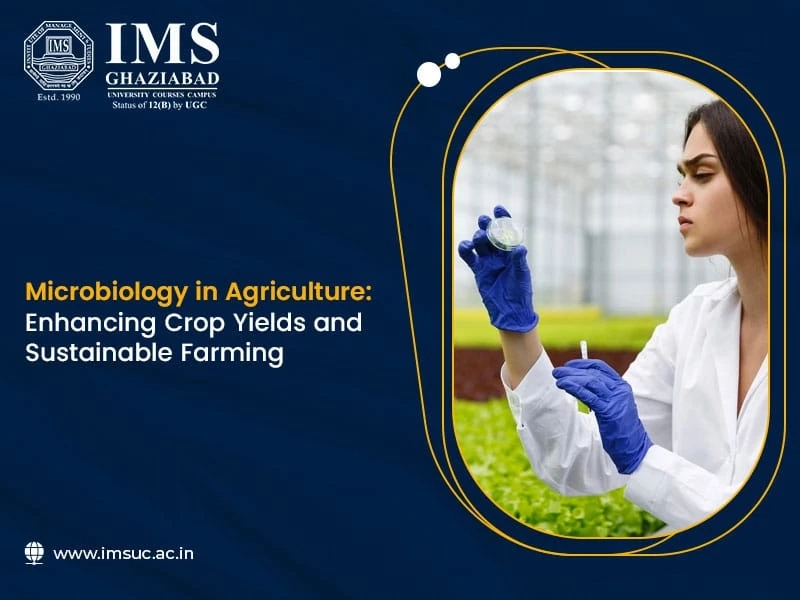The rapid growth of science has been a positive asset for India as it underlines our technological growth and academic advancement. Among these is the rapid utilisation of Microbiology, Teddy O Rahube once said, "Always trust a microbiologist because they have the best chance of predicting when the world will end."
Microbiology in itself is the study of organisms too small to be visible. The science includes the study of several organisms, such as:
- Bacteria
- Archaea
- Viruses
- Fungi
- Prions
- Protozoa
- Algae
Furthermore, science also delves into studies of nutrient cycling, biodegradation, climate change, food spoilage, disease control etc. Alongside biotechnologists, microbiologists played a crucial role during the COVID-19 pandemic and other issues by studying microbes for medicine production, biofuel manufacturing, food processing and reversing climate change.
Agricultural technologies have played a crucial role in the green revolution, which ensured the proper and adequate dispersing of food for the globe\'s population; however, this has come at several costs. Climate change, pollution and overall biodiversity loss are among the biggest challenges caused by unsustainable agriculture. As the world\'s second-largest wheat and rice producer, India is responsible for being more sustainable with its farming approach.
The advent of Microbiology and development of Microbial-technology has emerged with various solutions to crop quality, crop productivity, and sustainability of systems. Beyond this quality, microbiology can also positively utilise genetically modified GMO and transgenic crops.
Microbial technology can impact sustainable farming and crop yields through:
- Biofertilizers
- Biopesticides
- Bioherbicides
- Bioinsecticides
- Reducing agrochemical dependency
Developing these can lead to advanced management of Biotic and Abiotic stresses. Furthermore, Microbial-technology can also lead to advancement in plant modification, lesser virulence and disease diagnostic control.
Microbiology can also positively impact farming soil. Soil degradation has been one of the many challenges excessive chemical usage faces. However, microbiology promotes natural and environmentally safe practices that improve soil quality for better yields.
- Organic decomposition
- Assisting nitrogen fiction
- Plant Growth promoting bacteria (PGPB)
- Bioremediation of soil pollutants
- Enhance Crop resilience against abiotic factors
The abovementioned factors can be applied through microbes and microbiology to provide safer and more sustainable yields for Indian farmers and Populus.
Microbiology Hons at IMS Ghaziabad (University Courses Campus):
India\'s Microbiology education needs to install a degree of practicality alongside academic accomplishment to truly produce the cream of the crop. IMS BSc hons Microbiology does just that. Affiliated with Chaudhary Charan Singh University Meerut IMS, it offers a three-year undergraduate program to students who want to create solutions and contribute to microbiology.
Established on the pillars of academic excellence, research orientation, industry interaction and exemplary placements, the IMS BSc hons Microbiology program is made to produce cream of the crop talent. With only 60 seats, IMS wants to ensure quality education for deserving students.
What makes IMS Ghaziabad (University Courses Campus) Microbiology Program Unique:
IMS ghaziabad (University Courses Campus) Microbiology program is renowned for the following:
Course Specialization:
IMS offers specialization in Food and Dairy Microbiology and Professional and Scientific Communication
FOOD and DAIRY MICROBIOLOGY - Providing three courses each year, IMS Ghaziabad dives deeper into the food and dairy industry through
- Food preservation
- Analysis of food and dairy products
- Analysis of probiotics
- Food adulteration
- Study of food-borne pathogens
- Analysis of microbial contents in dairy products.
The specialization stream overlooks all the various practices occurring in the food industry to better substantiate its students\' knowledge and practical potential.
The PROFESSIONAL AND SCIENTIFIC COMMUNICATION specialization stream provides courses in
- Aero microbiology
- Soil microbiology
- Aquatic microbiology
- Microbiology of water water
- Water purification
- Degradation of plastic by microbes
The stream is meant to strengthen microbiologists\' understanding of microbes and how they function and the application of microbiology for environmental needs.
Course Structure
Properly divided within three years, the IMS BSc hons Microbiology program has 10+ course requirement subjects about each aspect of microbiology. The 3-year program includes detailed subjects such as
- YEAR 1
- Microbiology fundamental
- Bacteriology
- Biochemistry
- Biophysics
- Biology 1 & 2 (Zoology & Botany)
- YEAR 2
- Cell Biology
- Reproduction
- Microbial and metabolism
- Biostatistics
- Biomathematics
- YEAR 3
- Immunology
- Food and dairy microbiology
- Agriculture Microbiology
- Industrial Microbiology
- Biosafety and bioethics
Each course mentioned examines the agricultural impacts of excessive chemical usage and microbe-assisted farming and its natural benefits. The IMS BSc hons Microbiology program strengthens its students\' overall practical applications through industry interactions, dissertations, and project work emphasis, alongside providing a fully encompassing syllabus about each aspect.
Conclusion
Past alumni Of IMS\'s BSc hons Microbiology program have worked in the industry as nutrition assistant researchers, industrial or environmental microbiologists, medical technologies and more. Stay connected to learn about The IMS BSc microbiology admission and enroll in the best microbiology Institute in the country.



